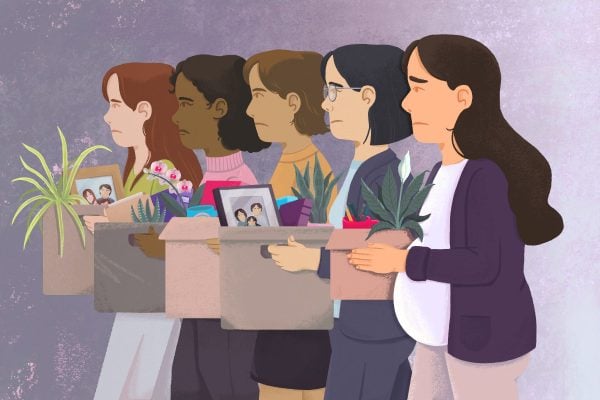labor Your Boss Now Has To Accommodate Pregnant Workers, From Morning Sickness to Abortion Care
As of June 27, after more than a decade of advocacy, workplace accommodations for pregnant people are finally law as the Pregnant Workers Fairness Act takes effect.
The law, which passed in December, requires that employers provide accommodations for pregnancy-related medical conditions, everything from pregnancy to childbirth to postpartum recovery.
It undoes a previous requirement that said employees must prove they should be accommodated. Instead, the onus will now be on employers to work in good faith with workers to provide accommodations.
The idea to expand protections dates back to 2011, when Dina Bakst, the cofounder and co-president of A Better Balance: The Work & Family Legal Center, realized pregnant workers who were turning to the organization for help were not sufficiently covered under existing law. It was an issue of racial equity — many were women of color working in low-paying jobs.
Bakst wrote an op-ed in the New York Times in 2012 suggesting lawmakers pass a law that specifically granted pregnant people a right to accommodations at work rather than make them jump through hoops. The op-ed launched a movement that has been working since then to pass the Pregnant Workers Fairness Act, which was first introduced in Congress that year.
Elizabeth Gedmark, the current vice president at A Better Balance who worked with Bakst to do the initial legal research on the law, said the road to passage was difficult because so few people knew anything about the issue.
“What we heard so frequently was people said, ‘We had no idea this was a problem, that pregnant workers were falling through the gaps in the law,’” Gedmark said. “And then in the last 10 years, we still continued to hear that. We worked to raise awareness about it, but even now as we are making sure that people know about the Pregnant Workers Fairness Act, there are still some who don’t understand why it was necessary, who thought that it already was covered.”
Stories of pregnant workers who asked for simple accommodations — a water bottle, a stool or break time — and were then pushed out of jobs helped the movement gain supporters over the years.
Now, the final version of the law not only clarifies the role employers pay, but offers an expansive set of protections that includes accommodations such as time off from work after childbirth for recovery, effectively creating access to unpaid leave for many workers of color who don’t qualify for federal leave.
“Especially for low-wage working women and women of color, especially Black and Latina women, there has been generations of undervaluing fair labor, even though that labor is the backbone of our economy,” Gedmark said. “The Pregnant Workers Fairness Act is going to change that. We are going to see a shift because pregnancy discrimination will no longer be tolerated.”
Here is what the Pregnant Workers Fairness Act does and doesn’t cover, what to know about requesting an accommodation and what responsibilities employers have.
What is the Pregnant Workers Fairness Act?
The Pregnant Workers Fairness Act requires certain employers to offer “reasonable accommodations” to employees in the workplace for medical conditions related to the entire period from pregnancy to postpartum recovery. That includes accommodations for fertility treatments, morning sickness — including hyperemesis, an extremely severe morning sickness and nausea condition — lactation, complications, gestational diabetes, pregnancy loss, postpartum depression and conditions including mastitis, an infection of the breast tissue that typically occurs when breastfeeding. It includes time off to recover from childbirth, as well as time off to access abortion care.
The law passed Congress as part of an omnibus spending bill in December 2022 and goes into effect June 27.
Who is covered by the PWFA?
The law protects those who work for private or public sector employers with 15 employees or more. Congress, federal agencies, employment agencies and labor organizations are all covered, according to the Equal Employment Opportunity Commission (EEOC), the agency tasked with enforcing the law.
The law does not cover very small employers. The cutoff at 15 employees mirrors other workplace discrimination laws that set the same standard.
How does the Pregnant Workers Fairness Act close a loophole in the law?
The main protection under the law is to close an existing loophole and build on the federal law that already protects pregnant people at work, the Pregnancy Discrimination Act. Before the Pregnant Workers Fairness Act, workers could only get an accommodation if they could prove that another employee was given an accommodation, the result of a 2015 Supreme Court case.
In that case, Young v. UPS, a pregnant UPS driver requested to lift no more than 20 pounds at the recommendation of her OBGYN and midwife, but UPS denied the request saying it only provided light duty for workplace injuries. The court ultimately sided with the worker but created a standard through which a worker would have to prove the company accommodated a similarly-situated employee.
Before the Pregnant Workers Fairness Act, few workers were able to access those protections — pregnancy is too unique to compare to other workers seeking accommodations for other needs. Similarly, the Americans with Disabilities Act also provides some protections but it limits reasonable accommodations protections to workers with a pregnancy-related disability, such as gestational diabetes or preeclampsia.
The existing laws left many workers, particularly women of color in low-wage jobs, vulnerable and often having to choose between protecting the safety of their pregnancy or losing their job. A Better Balance collected numerous stories over the years of workers who were pushed out of jobs or fired because they requested to be accommodated.
Now under the Pregnant Workers Fairness Act, a worker also does not need to have a pregnancy-related disability to qualify for protections, they simply need to be pregnant and request an accommodation.
What are examples of accommodations?
Examples could be giving a worker additional time to sit, rest, drink, eat or use the bathroom. It could mean relaxing some policies to allow workers a stool to sit on, allow them to wear maternity clothing or allow a water bottle in an area where it’s not typically allowed. Schedule-wise, accommodations could include time off for prenatal appointments, accommodating for morning sickness or allowing remote work if available.
For workers with jobs that require significant manual labor, transferring workers to light duty or temporarily transferring them to a less physically demanding job would constitute an accommodation.
How much time does the Pregnant Workers Fairness Act allow to recover from childbirth?
If a worker needs time off to recover from a vaginal delivery or a Cesarean section, they can tap into the Pregnant Workers Fairness Act to take unpaid time off. Their job would be protected during this time, so they could not be fired for taking the time. This is especially important for workers who do not have access to time off through the Family and Medical Leave Act, for example, which offers unpaid time off following the birth of a child but has limitations including a requirement that workers be at a job for a year before they qualify. Under the Pregnant Workers Fairness Act, a worker would qualify for unpaid time off regardless of whether they’ve been at a job for a year.
The time off would be for the duration of the recovery period. Many people have a first postpartum appointment around six weeks following childbirth, and for C-sections, the recovery can be even longer.
What kinds of things does the law block employers from doing?
According to the EEOC, employers cannot require an employee to accept an accommodation without discussing it with them first, nor can they require an employee to take leave if an accommodation is already available that would allow the employee to keep working.
Employers can’t deny anyone a job because of their accommodation request.
What if the accommodation is too difficult for the employer to do?
Employers need to prove that the accommodation would create “undue hardship,” meaning it would be too costly or burdensome on the business to provide. That is going to be a difficult standard to meet because the accommodation is only temporary, Gedmark said.
“Since this is just a temporary condition, it’s going to be extremely hard for an employer to say, ‘Oh, I couldn’t do that for a few weeks or a month or even a few months,’” she said. “The assumption should really be: This is going to be workable.”

Employers can’t deny anyone a job because of their accommodation request.
What is the employer’s responsibility if a worker requests an accommodation?
Under the law, the employer must engage in an “interactive process,” which is a good-faith conversation to try to help meet the worker’s needs.
This process removes the onus off the worker: Pregnant workers don’t need to prove that someone else is similarly-situated or even mention the Pregnant Workers Fairness Act at all. It is simply a conversation through any medium (phone, email or in person) in which the employer responds promptly and tries to find an accommodation.
Is it OK to ask for an accommodation that would mean no longer performing “essential functions”?
Yes, as long as the worker would be able to perform those functions in the near future — the accommodation is only for a temporary period of time.
How do workers request an accommodation?
A Better Balance provides sample letters for how employees should communicate with their employer about an accommodation request. Employees may explain that they are requesting an accommodation under the Pregnant Workers Fairness Act, though they do not need to specifically name the law — simply telling their employer they’re pregnant will suffice. Workers should delineate why they are making the request and what kind of accommodation they would need, including the timeframe they would need it.
For the Pregnant Workers Fairness Act to apply, it is key that workers tell their employer that they are requesting time off due to something related to pregnancy. Later this year, the EEOC will provide more guidance on whether an employer can legally ask for supporting documentation, such as a note from a health care provider.
What happens if an employer does not comply?
Workers can file complaints with the EEOC beginning on June 27. The complaint needs to be related to actions that took place June 27 or later.
Advocates are asking the EEOC to prioritize Pregnant Workers Fairness Act cases because of their time-sensitive nature. The agency will be releasing its regulations for the law by the end of the year that will further clarify enforcement details.
If a complaint is filed with the EEOC, the employer will be notified.
Workers can reach out to A Better Balance’s legal assistance line if they have additional questions at 1-833-633-3222.
The Center for WorkLife Law also runs a free and confidential legal help line for those who have questions on the law. They can email hotline@worklifelaw.org or call 415-703-8276 to leave a message. Services are in English and in Spanish with other languages available upon request.
For the Pregnant Workers Fairness Act to apply, it is key that workers tell their employer that they are requesting time off due to something related to pregnancy. (GETTY IMAGES)
Are workers protected from retaliation if they file a complaint under the PWFA?
Yes. Workers are protected at every stage from retaliation from their employer. Employers cannot retaliate against workers who request an accommodation, who file a complaint, who help with an investigation into another worker’s complaint or who testify to the EEOC.
What does this mean for state and local laws?
The Pregnant Workers Fairness Act should be seen as a foundation — any local or state law with stronger protections would take precedence over the PWFA. More than 30 states and cities have laws that address accommodations for pregnant employees, according to A Better Balance.






Spread the word